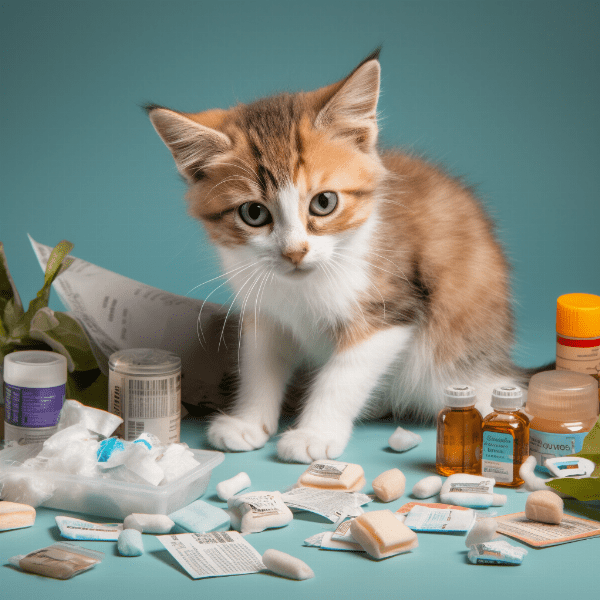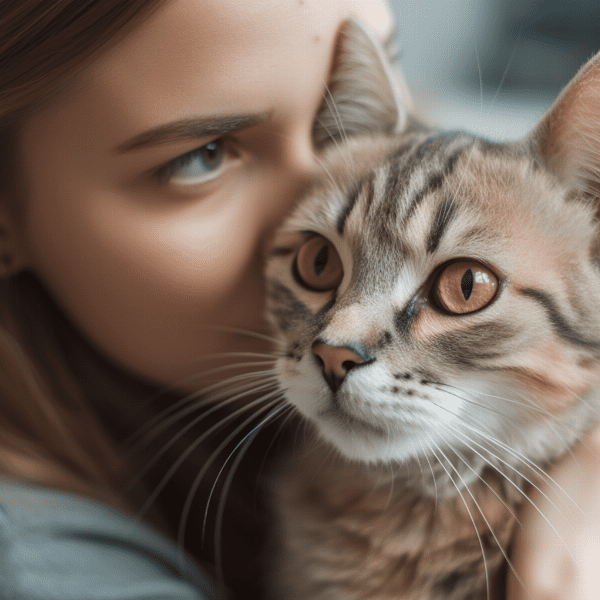Table of Contents
- Understanding Newborn Kitten Eye Infection
- Symptoms of Newborn Kitten Eye Infection
- Causes of Newborn Kitten Eye Infection
- Diagnosis of Newborn Kitten Eye Infection
- Treatment Options for Newborn Kitten Eye Infection
- Home Remedies for Newborn Kitten Eye Infection
- Preventing Newborn Kitten Eye Infection
- When to Seek Veterinary Care for Newborn Kitten Eye Infection
- Caring for a Kitten with Eye Infection
- Final Thoughts on Newborn Kitten Eye Infection Management
Understanding Newborn Kitten Eye Infection
Newborn kittens are adorable, and their bright eyes are often the first thing we notice about them. However, if a kitten’s eyes appear red, swollen, or have discharge, it’s a sign that the kitten may have an eye infection. Infections can be caused by bacteria, viruses, or even a blocked tear duct. Understanding the causes and symptoms of an eye infection is crucial in providing appropriate treatment.
Causes of Newborn Kitten Eye Infection
There are several causes of eye infections in newborn kittens. The most common causes are bacterial and viral infections. The bacterial infection may be due to bacteria like Chlamydia, Mycoplasma, or Streptococcus. Viral infections can be caused by Feline Herpesvirus, Feline Calicivirus, or Feline Immunodeficiency Virus. Infections can also be caused by the kitten’s weak immune system or due to environmental factors like dusty litter boxes, overcrowded living conditions, and unsanitary environments.
Symptoms of Newborn Kitten Eye Infection
Symptoms of a Newborn kitten eye infection may vary depending on the cause of the infection. Some of the most common symptoms include:
- Redness or inflammation around the eyes
- Swollen eyelids
- Discharge from the eyes
- Crusty or sticky eyelids
- Cloudiness or opacity in the eyes
- Squinting or difficulty keeping eyes open
- Rubbing or scratching the eyes
Diagnosis of Newborn Kitten Eye Infection
If you notice any of the symptoms mentioned above, it’s crucial to take your kitten to the vet. The vet will conduct a thorough examination to determine the underlying cause of the infection. The diagnosis may involve collecting a swab from the kitten’s eye and culturing it to identify the type of bacteria or virus causing the infection. Additionally, the vet may perform a complete blood count to determine if there are any abnormalities in the kitten’s blood.
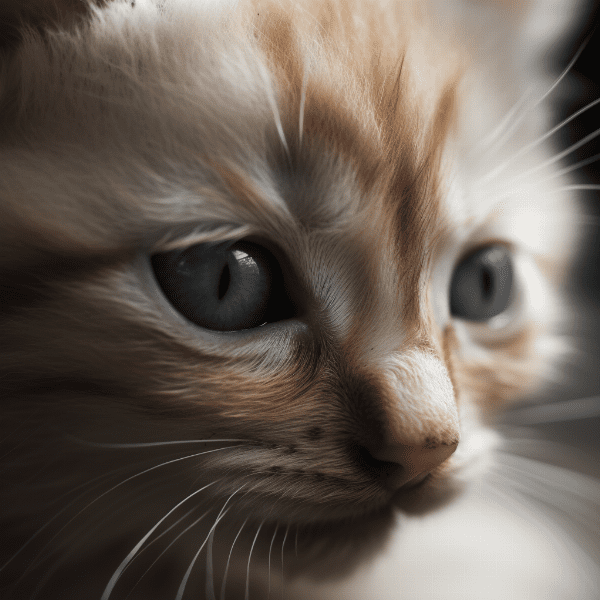
Symptoms of Newborn Kitten Eye Infection
As mentioned earlier, eye infections in newborn kittens can be caused by several factors, including bacteria, viruses, or blocked tear ducts. The symptoms of an eye infection can vary depending on the underlying cause.
Redness or Inflammation Around the Eyes
One of the most common symptoms of a newborn kitten eye infection is redness or inflammation around the eyes. The affected area may appear swollen and tender to the touch.
Squinting or Difficulty Keeping Eyes Open
Kittens with an eye infection may also experience squinting or difficulty keeping their eyes open. This may be due to pain or discomfort caused by the infection.
Rubbing or Scratching the Eyes
Kittens with an eye infection may also rub or scratch their eyes frequently. This can lead to further irritation and may exacerbate the infection.
If you notice any of these symptoms in your newborn kitten, it’s essential to seek veterinary care immediately. In the next section, we’ll discuss some of the common causes of eye infections in newborn kittens.
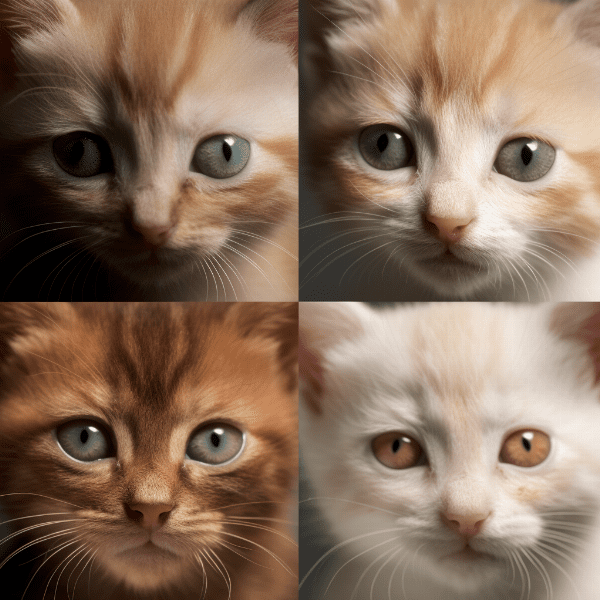
Causes of Newborn Kitten Eye Infection
As mentioned earlier, eye infections in newborn kittens can be caused by several factors. Understanding the causes of eye infections is crucial to prevent their occurrence and to provide appropriate treatment.
Bacterial Infections
Bacterial infections are one of the most common causes of eye infections in newborn kittens. Bacteria like Chlamydia, Mycoplasma, and Streptococcus can cause conjunctivitis, a type of eye infection. Bacterial infections can be transmitted from the mother to the kitten during birth or through contact with contaminated objects or surfaces.
Viral Infections
Viral infections can also cause eye infections in newborn kittens. Feline Herpesvirus, Feline Calicivirus, and Feline Immunodeficiency Virus (FIV) are common viral infections that can cause eye infections. These viruses can be transmitted from the mother to the kitten or through contact with infected cats.
Blocked Tear Ducts
Blocked tear ducts can also cause eye infections in newborn kittens. The tear ducts may be blocked due to congenital abnormalities or inflammation. This can lead to the accumulation of tears and discharge, which can cause infection.
Environmental Factors
Environmental factors can also contribute to the development of eye infections in newborn kittens. Dusty litter boxes, overcrowded living conditions, and unsanitary environments can lead to the growth and spread of bacteria and viruses, increasing the risk of infection.
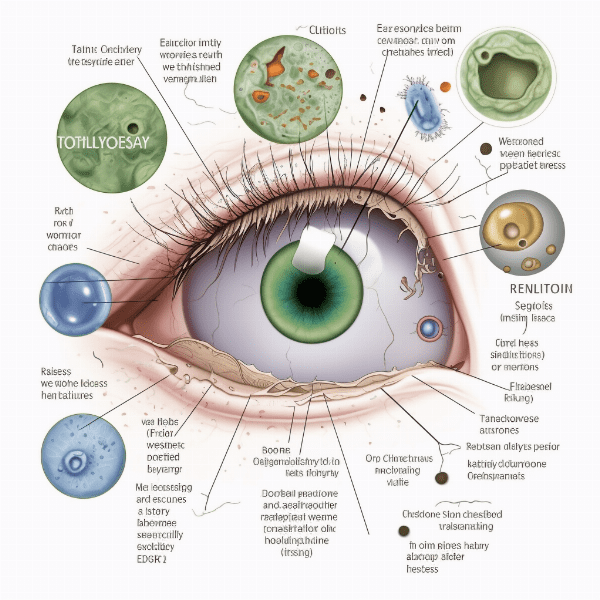
Diagnosis of Newborn Kitten Eye Infection
If you suspect that your newborn kitten has an eye infection, it’s essential to seek veterinary care immediately. The vet will conduct a thorough examination to determine the underlying cause of the infection and develop an appropriate treatment plan.
Physical Examination
The first step in diagnosing a newborn kitten eye infection is a physical examination. The vet will examine the kitten’s eyes for any signs of redness, inflammation, discharge, or cloudiness. The vet will also check for any other symptoms that may indicate an infection, such as fever or loss of appetite.
Eye Swab and Culture
If the vet suspects a bacterial or viral infection, they may collect a swab from the kitten’s eye to identify the type of bacteria or virus causing the infection. The swab will be sent to a laboratory for culture and sensitivity testing, which will determine the most effective treatment options.
Blood Test
In some cases, the vet may perform a blood test to determine if there are any abnormalities in the kitten’s blood. This can help identify any underlying conditions that may be contributing to the eye infection.
Underlying Conditions
In some cases, eye infections in newborn kittens may be a symptom of an underlying condition. The vet may conduct additional tests to rule out any underlying conditions that may be causing the eye infection.
Understanding the underlying cause of a newborn kitten eye infection is crucial to developing an appropriate treatment plan. In the next section, we’ll discuss the treatment options available for eye infections in newborn kittens.
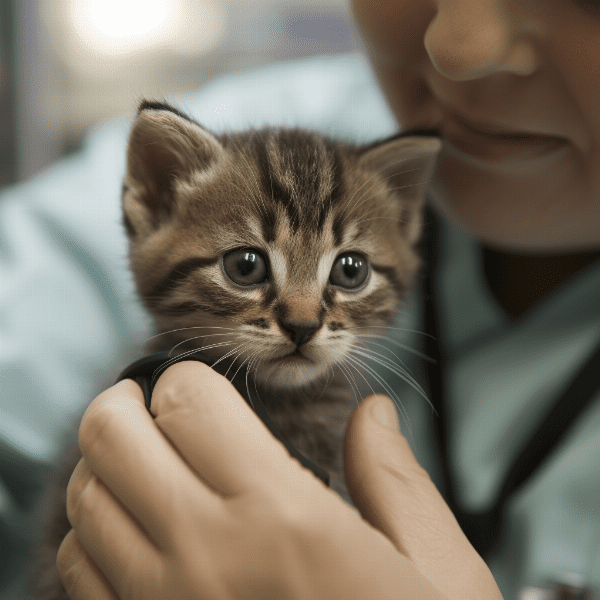
Treatment Options for Newborn Kitten Eye Infection
Treatment options for newborn kitten eye infections depend on the underlying cause of the infection. In most cases, treatment involves a combination of medication and home care.
Medication
Medication is often necessary to treat bacterial and viral infections in newborn kittens. Antibiotics and antiviral medications may be prescribed to help fight the infection. Eye drops or ointments may also be prescribed to reduce inflammation and relieve discomfort.
Home Care
Home care is essential in managing newborn kitten eye infections. You can clean your kitten’s eyes with a warm, damp cloth to remove any discharge. Make sure to use a separate cloth for each eye to prevent cross-contamination. You can also use saline solution to flush your kitten’s eyes gently.
Preventative Care
Preventative care is crucial in preventing the occurrence of eye infections in newborn kittens. Make sure to keep your kitten’s living area clean and sanitary, and provide them with a healthy and balanced diet. Regular veterinary checkups can also help identify any underlying conditions that may contribute to eye infections.
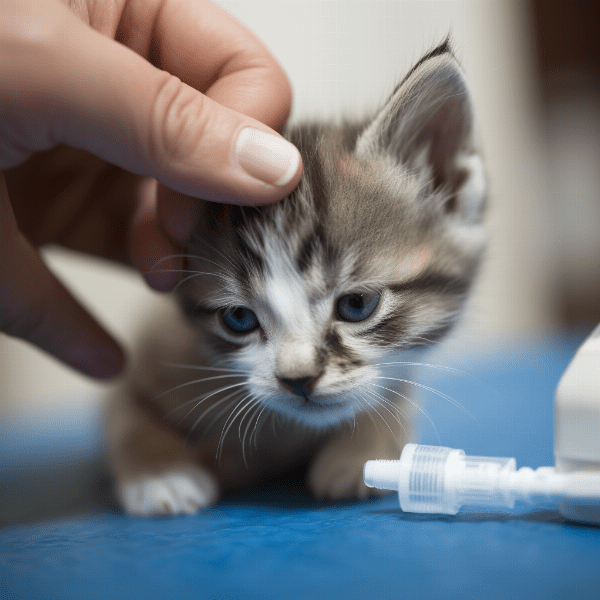
Home Remedies for Newborn Kitten Eye Infection
In addition to medication and veterinary care, there are some home remedies that can help manage newborn kitten eye infections. It’s essential to note that these remedies should not replace veterinary care and medication, but rather be used in conjunction with them.
Warm Compress
A warm compress can help soothe the eyes and reduce inflammation. To make a warm compress, soak a clean cloth in warm water and wring out the excess water. Gently apply the cloth to your kitten’s eyes for a few minutes at a time.
Saline Solution
Saline solution can help flush out the eyes and reduce discharge. To make a saline solution, mix one teaspoon of salt with one cup of warm water. Use a dropper or syringe to apply the solution to your kitten’s eyes.
Chamomile Tea
Chamomile tea has anti-inflammatory properties and can help reduce redness and inflammation in the eyes. Brew a cup of chamomile tea and let it cool. Use a clean cloth to apply the cooled tea to your kitten’s eyes.
Breast Milk
Breast milk contains antibodies that can help fight infections. Apply a small amount of breast milk to your kitten’s eyes using a dropper or cotton swab.
.
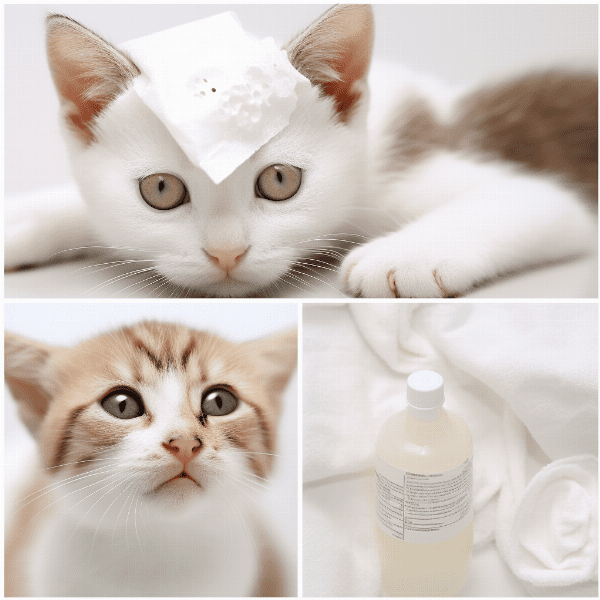
Preventing Newborn Kitten Eye Infection
Preventing newborn kitten eye infections is crucial in ensuring the health and well-being of your kitten. Here are some preventative measures you can take:
Keep the Environment Clean
Keeping your kitten’s living area clean is essential in preventing the growth and spread of bacteria and viruses. Make sure to clean the litter box regularly and keep the living area free of any debris.
Wash Hands
Washing your hands before handling your kitten is crucial in preventing the spread of bacteria and viruses. Make sure to wash your hands thoroughly with soap and water before handling your kitten.
Vaccination
Vaccination is crucial in preventing viral infections that can cause eye infections in newborn kittens. Make sure to follow your vet’s vaccination schedule to ensure your kitten is protected.
Proper Nutrition
Proper nutrition is crucial in maintaining a strong immune system. Make sure to provide your kitten with a healthy and balanced diet that is rich in vitamins and minerals.
Eye Protection
Eye protection is essential in preventing injuries that can lead to eye infections. Make sure to keep sharp objects away from your kitten and provide them with a safe and comfortable living environment.
By following these preventative measures, you can reduce the risk of eye infections in newborn kittens. If you suspect that your kitten has an eye infection, seek veterinary care immediately for proper diagnosis and treatment.
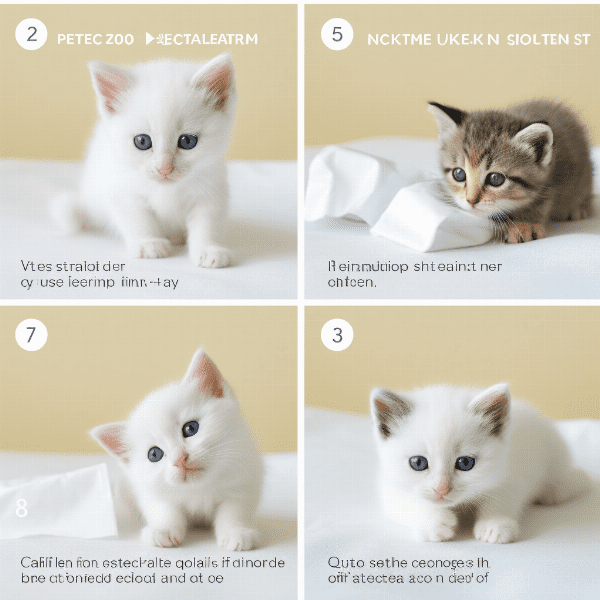
When to Seek Veterinary Care for Newborn Kitten Eye Infection
Newborn kitten eye infections can be challenging to manage, and it’s crucial to seek veterinary care as soon as possible. Here are some signs that indicate it’s time to seek veterinary care:
Cloudiness or Opacity in the Eyes
Cloudiness or opacity in the eyes is a severe symptom that requires immediate veterinary care. This can be a sign of a more severe infection or underlying condition.
Loss of Appetite or Lethargy
If your kitten shows signs of a loss of appetite or lethargy, it’s time to seek veterinary care. These symptoms can indicate a more severe infection or underlying condition.
Discharge from the Eyes
If your kitten’s eyes have a discharge that persists for more than a day or two, it’s time to seek veterinary care. Discharge can indicate an infection that requires treatment.
Eye Injury
If your kitten has an eye injury, seek veterinary care immediately. Eye injuries can lead to infections and require prompt treatment to prevent further damage.
If you notice any of these symptoms in your newborn kitten, seek veterinary care immediately. Early treatment can help manage the infection and prevent further complications.
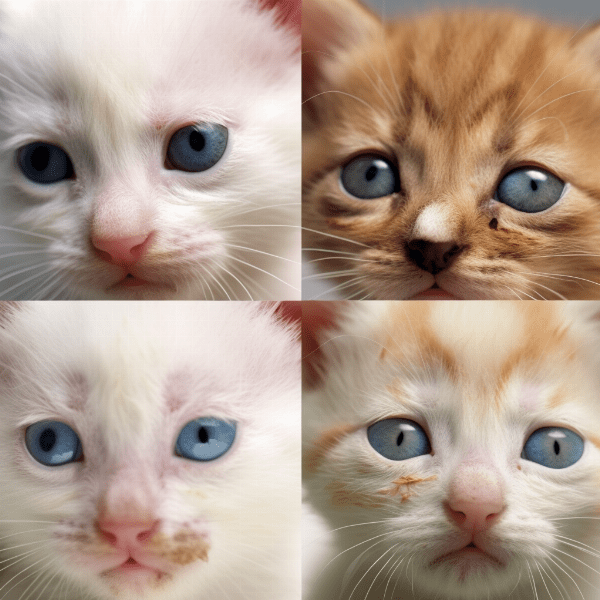
Caring for a Kitten with Eye Infection
Follow Veterinary Instructions
Follow the veterinary instructions carefully to ensure your kitten receives the proper care and treatment. Make sure to administer medication as directed and keep all follow-up appointments.
Clean the Eyes Regularly
Clean your kitten’s eyes regularly to remove any discharge and keep the area clean. Use a warm, damp cloth to gently wipe away any discharge. Use a separate cloth for each eye to prevent cross-contamination.
Provide Eye Protection
Provide eye protection for your kitten, especially if they are rubbing or scratching their eyes. A cone or an Elizabethan collar can prevent your kitten from further irritation and injury.
Provide a Comfortable Environment
Provide a comfortable and stress-free environment for your kitten to help them recover. Make sure to provide them with plenty of water and a comfortable place to rest.
Caring for a kitten with an eye infection can be challenging, but with proper care and treatment, most infections can be resolved. By following these tips, you can help your kitten recover and prevent the occurrence of future infections.
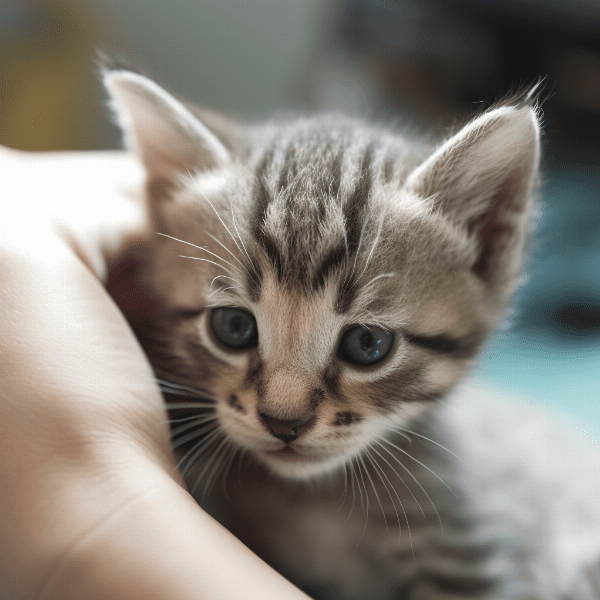
Final Thoughts on Newborn Kitten Eye Infection Management
Newborn kitten eye infections can be challenging to manage, but with proper care and treatment, most infections can be resolved. Here are some final thoughts on managing newborn kitten eye infections:
Seek Veterinary Care Immediately
If you suspect that your kitten has an eye infection, seek veterinary care immediately. Early intervention can prevent the infection from worsening and causing further complications.
Understand the Causes
Understanding the causes of eye infections in newborn kittens is crucial to prevent their occurrence and provide appropriate treatment. Bacterial and viral infections, blocked tear ducts, and environmental factors can all contribute to eye infections.
Follow Preventative Measures
Following preventative measures can reduce the risk of eye infections in newborn kittens. Keeping the environment clean, washing your hands before handling your kitten, and providing proper nutrition can help prevent infections.
Proper Treatment and Care
Proper treatment and care are essential in managing newborn kitten eye infections. Medication, home care, and preventative measures can help manage the infection and prevent further complications.
By following these tips, you can help manage newborn kitten eye infections and ensure the health and well-being of your kitten. Remember, if you suspect that your kitten has an eye infection, seek veterinary care immediately.


